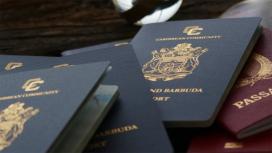Blog • Published on:October 22, 2025 | Updated on:October 21, 2025 • 8 Min
Your Complete Guide to Caribbean Travel Requirements and Entry Rules in 2025
Planning to explore more than one Caribbean Island on your next trip? Good call, the region is made for short hops between islands, whether you're flying, sailing, or cruising.
But while travel in the Caribbean feels easy-going, the entry requirements aren’t always the same from one island to the next.
Some destinations require a full passport with six months’ validity. Others may allow visa-free entry for up to 90 days, depending on your nationality. And if you're on a cruise, the rules can shift again.
This guide breaks down what you need to know before you go, so you can focus on the trip, not the paperwork.
Caribbean Travel Documentation Requirements
Island hopping in the Caribbean might feel like domestic travel, but border rules still apply. Most islands have their own entry policies, even if you're just a short flight away. Understanding what documents, you need can save you from last-minute airport issues or denied boarding.
General Passport Requirements
A full, valid passport is needed to enter almost all Caribbean nations. If your passport is set to expire within a few months, airlines may deny boarding, regardless of the country’s minimum requirement.
Visa-Free Travel for Common Nationalities
Most Caribbean countries offer visa-free entry (30 to 180 days) for short stays to travellers from:
- United States
- United Kingdom
- Canada
- EU/Schengen Area
- Australia
- New Zealand
However, a few destinations, such as Cuba, still require a tourist card or entry permit.
Entry Rules for Popular Islands
Do US Citizens Need a Passport for the Caribbean?
Yes, US citizens generally need a valid passport to travel to most Caribbean nations by air. However, there are exceptions for US territories and specific cruise routes.
Where a Passport Is Required
Where a Passport Is Not Required
For air travel, always bring your passport, even if the country allows entry without a visa.
For closed-loop cruises, you may re-enter the US with just a birth certificate and government-issued ID, but you might still need a passport to disembark at foreign ports.
UK Citizens’ Caribbean Travel Requirements
UK passport holders enjoy broad visa-free access across the Caribbean, especially in Commonwealth nations. But entry rules still vary slightly by destination.
Passport Validity for British Citizens
Most islands require:
- Valid passport for duration of stay
- At least 6 months validity recommended (airlines often enforce this)
- One to two blank pages for entry stamps
Visa-Free Caribbean Access for UK Travelers
British nationals traveling for tourism rarely need visas, but work, study, or long-term stays may require advance approval.
Commonwealth Ties: Extra Benefits
As a Commonwealth citizen, UK travellers often benefit from:
- Extended visa-free durations
- Simplified arrival procedures
- Faster residency or special visa options (case-by-case)
Caribbean Entry Requirements by Destination
Caribbean travel rules vary from island to island, even for travellers who don’t need a visa. Some countries enforce stricter document checks, while others streamline the process for tourism.
Bahamas Travel Documents
- Visa-free for US, UK, EU, Canada (up to 90 days)
- Passport validity: At least 6 months recommended
- Arrival forms: Required upon landing
- Cruise passengers: Closed-loop cruise travellers may use a birth certificate + ID, but a passport is strongly advised
Entry for land or air travel always requires a valid passport. Even if you're cruising, it’s safer to bring one to avoid issues at foreign ports.
Dominican Republic Requirements
- Visa-free for most Western travellers (US, UK, EU, Canada)
- Tourist card: Included in airfare for flights
- Mandatory e-Ticket: Online immigration/customs form required before arrival and departure
- Passport validity: Must cover duration of stay (6 months recommended)
You must complete the digital e-Ticket before flying, immigration no longer accepts handwritten forms.
Antigua and Barbuda Entry Rules
- Visa-free for US, UK, EU, Canada (up to 180 days)
- Passport validity: At least 6 months from entry date
- Return/onward ticket: Required
- Arrival forms: Disembarkation/embarkation card typically completed on arrival
All travelers should carry proof of sufficient funds and a return ticket.
Saint Lucia Entry Guidelines
- Visa-free for US, UK, EU, Canada (42–90 days depending on nationality)
- Passport validity: Must cover entire stay; 6 months recommended
- Return/onward ticket: Required
- Health insurance: Not mandatory, but encouraged for stays over 30 days
Saint Lucia allows visa extensions for eligible travellers, and immigration is generally quick, but you must meet all entry requirements at the port.
Essential Travel Documents for Caribbean Visits
Beyond your passport, most Caribbean destinations require a few additional documents. These are often checked on arrival, and sometimes at boarding.
Passport Validity Requirements
- Minimum 6 months validity is standard, though some islands accept validity for the length of stay
- Always check your airline’s policy, it may be stricter than the country’s rules
- Carry at least one blank page for stamps
Additional ID Requirements
- Not usually required if you have a passport
- Some cruise lines may request a driver’s license or government-issued photo ID for onboard verification
- Children may need original birth certificates for cruise travel
Return Ticket Proof
- Most immigration officers ask for a return or onward ticket
- You may also be asked to show proof of accommodation or travel plans
- In rare cases, officials may deny entry without a confirmed departure date
Immigration Forms
Some forms can be completed in advance online, while others are handed out during the flight or at immigration.
Caribbean Cruise Travel Documentation
Cruising through the Caribbean can come with different document rules compared to flying. What you need depends on whether your cruise is closed-loop (starting and ending at the same U.S. port) or open-loop (different start and end points or foreign departure).
Closed-Loop Cruise Rules
- US citizens do not need a passport to re-enter the US
- Acceptable documents include original birth certificate + government-issued photo ID and passport (still recommended).
- Some foreign ports may still require a passport to disembark
Example: You can board a closed-loop cruise to the Bahamas without a passport, but you might be denied entry if a passport is required at the port.
Open-Loop Cruise Requirements
- Passport is required
- Includes cruises that start and end in different ports or depart from outside the U.S.
- This applies to most European and international cruise itineraries
Special Caribbean Travel Circumstances
Not every traveller fits the standard tourist profile. If you're traveling with children, staying long-term, or coming from a non-Western country, different rules may apply.
Minor Travel Requirements
- Children under 18 often need additional documents:
- Passport
- Birth certificate
- Consent letter if traveling with one parent or a guardian
- Some islands require notarized parental consent forms for solo-traveling minors
Airlines and immigration officers may deny boarding without these documents, even if the child has a valid passport.
Non-US/UK Citizen Guidelines
- Visa requirements vary significantly
- Check with the embassy of each island if you're from outside the US, UK, EU, Canada, or Australia
- Nationals of countries like India, Nigeria, South Africa, and the Philippines may need advance visas or e-visas
Digital Travel Authorization Systems
Many Caribbean nations now require travellers to complete online forms or digital approvals before arrival. These systems help speed up immigration but are mandatory in some destinations.
Online Entry Forms
You must present a QR code or confirmation screen when arriving in countries with digital entry forms.
Pre-Arrival Registration
Some islands request registration in advance, especially for charter flights, private yachts, or non-commercial entries.
These may include uploading copies of your passport, itinerary, and lodging confirmation. Also, don't forget to check official tourism or immigration websites before traveling.
Tips for Hassle-Free Caribbean Travel
Smooth travel in the Caribbean starts with the right documents, packed early and stored smart. Here are quick tips to avoid surprises at the airport or cruise terminal.
Document Preparation Timeline
Storage and Safety Tips
- Carry both digital and paper copies of key documents
- Use a waterproof pouch or organizer for travel days
- Save scans of your passport and ID in secure cloud storage
- Share a copy with a trusted friend or family member in case of emergency
Traveling Smart in the Caribbean
Caribbean travel still has that “easy-breezy” feeling, but modern requirements mean travelers need to prep like they would for any international trip. Whether you’re flying to Saint Lucia, cruising into Antigua, or combining three islands in one week, keeping your documents sorted is key to avoiding last-minute drama at the gate or immigration desk.
Each island runs its own border policy, even when they share cultural or geographic ties. That means a short flight can involve very different paperwork. The safest approach? Travel with a valid passport, complete all digital forms before arrival, and always have a backup plan (like scanned copies and proof of onward travel). A little planning goes a long way in making sure your Caribbean escape stays stress-free.
FAQs on Caribbean Travel Documentation
1. Do I need a passport for Caribbean cruises?
Yes, for most cases. You can skip it on a closed-loop cruise (same U.S. start/end port) if you bring a birth certificate + ID, but a passport is still highly recommended.
2. How long should my passport be valid when traveling to the Caribbean?
Most islands require at least 6 months of validity from your date of entry. Some allow shorter, but airlines may still enforce the 6-month rule.
3. Which Caribbean countries require digital forms before arrival?
As of 2025, the Dominican Republic (e-Ticket), Aruba (ED Card), and Saint Lucia all require pre-arrival digital immigration forms.
4. Can I stay longer than the visa-free period?
Yes, but you must apply for an extension through the local immigration office. Overstaying can lead to fines or entry bans.
5. What if I lose my passport while in the Caribbean?
Contact your country’s nearest embassy or consulate. US citizens can apply for an emergency passport, while UK travelers can request an Emergency Travel Document (ETD).
References
Government of the Bahamas. (2024). Entry requirements for travelers. Retrieved from https://www.bahamas.gov.bs
Ministry of Tourism, Dominican Republic. (2025). E-Ticket digital entry platform. Retrieved from https://eticket.migracion.gob.do
Government of Antigua & Barbuda. (2024). Immigration and visa guidelines. Retrieved from https://immigration.gov.ag
Government of Saint Lucia. (2025). Visitor entry requirements and arrival forms. Retrieved from https://www.govt.lc
U.S. Department of State. (2025). Travel to the Caribbean – Passport & travel info by destination. Retrieved from https://travel.state.gov
Written By

Laura Weber
Laura Weber is a legal expert in international tax planning and citizenship by investment. With over a decade of experience, Laura helps individuals and families navigate complex legal frameworks to secure dual citizenship and global residency options, particularly in the Caribbean and Europe.
Related Articles









Recently Published









Book a free consultation


